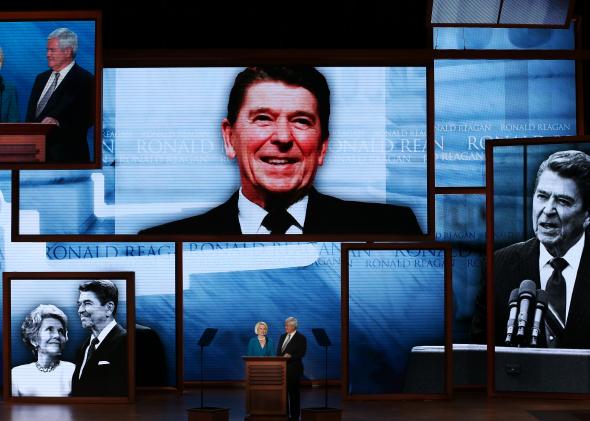Read the Letters at the Center of the New Reagan Book “Plagiarism” Controversy

Photo by Mark Wilson/Getty Images
If you click around Slate, you will find a review of Rick Perlstein's long-awaited 1970s history, The Invisible Bridge, and you'll find a podcast interview with the author. Both of these items were finished before the New York Times published a story about author/political strategist Craig Shirley, who has insisted that Perlstein plagiarized his 2005 book about Ronald Reagan's near-miss presidential primary run against Gerald Ford.
The Times' story is not quite definitive; it takes a teach-the-controversy, he said/she said approach to the story. "Mr. Shirley said he has since tallied close to 50 instances where his work was used without credit," reports Alexandra Alter, who quotes Perlstein describing the instances as paraphrases.
But how did it start? Shirley told me yesterday that Perlstein contacted him when he (Shirley) was at a meeting of Reagan scholars, and wanted to run 10 citations by him, stories that had appeared in Shirley's book that he was trying to confirm independently. By the time Shirley got back to him, Perlstein had found the sources.
"He apologized and asked me if I would review his book," said Shirley. "I asked my research assistant to get a review copy. I get it, I sit down, I start looking, I see my own writing in his book, not cited or credited to me."
It did not matter to Shirley that Perlstein had put citations online, or that at the end of the book Perlstein thanked the conservative for saving him "3.76 months" of research.
"My name is only mentioned in passing, and then almost dismissively," said Shirley. "What does he mean by 3.76 months? I don’t even know what the fuck that means. He didn’t interview Dick Cheney. I did. He didn’t interview Jim Baker. I did."
Shirley's attorney set to work on a letter, which you can read below. "He lifts without attribution entire passages," wrote the attorney, "attempting to conceal his theft by altering words or re-ordering sentences, but in other instances not even bothering to do so."
Three days later, the attorney sent another letter, offering more examples and repeating the demands for redress.
On July 30, Simon & Schuster responded. "Your claim ignores the most basic principle of copyright law," the publisher argued. "Copyright only protects an author's original expression. It is therefore important in any copyright analysis to distinguish between original expression and the unprotected elements of a work." Everything Shirley complained about was a "historical fact."
One of the examples cited by Simon & Schuster's attorneys gets at the nub of this. One of Shirley's scoops, in the 2005 work, was that Ronald Reagan was goaded unexpectedly into addressing the 1976 Republican National Convention. In his telling, the push onstage was done with the expectation that Reagan would come up short—he had not prepared a speech. "I now know from Craig Shirley that Reagan spoke without notes," writes Fred Barnes in his introduction.
"Not even is there plagiarism, but there are gross errors," Shirley told me yesterday. "He says Reagan’s appearance before the convention wasn’t spontaneous. I can show you copies of the tape, Reagan shaking his head no, he doesn’t want to go down and speak. There were 17,000 people in the arena, and none of them believed Reagan was going to make an appearance. That's just utterly and completely bad history."
But according to S&S, "Perlstein dug deeper." He found a clip from the Atlanta Daily World that included "the more revealing fact that Reagan ceased his laughter when he realized it was showing up on television." In Shirley's version of the story, Reagan was underrated once again; in Perlstein's, he is underrated but calculating. You can understand why Shirley is so upset at the new book; you can understand, too, why there is great interest in stopping Perlstein's history from becoming the official look at Reagan's rise.
